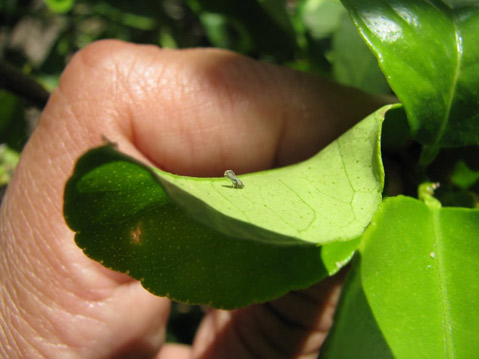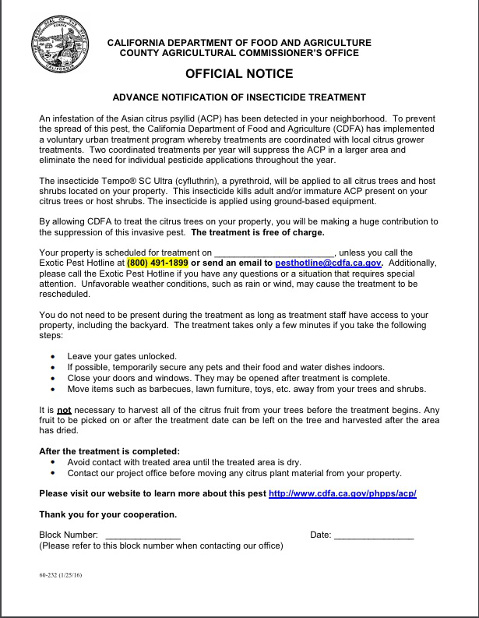Psyllid Spray Program Commences
Focuses on Killing Overwintering Bugs First

The Asian citrus psyllid eradication program that was to start Monday has been postponed to Wednesday, with Carpinteria likely to be the first area treated, according to pesticide hotline personnel. The spraying with Tempo SC Ultra is timed to attack adult psyllids before they lay their eggs on the new shoots of spring, said Steve Lyle, director of public affairs for California Department of Food and Agriculture. Imidacloprid soil application will take place later this year. Residents concerned about harm to bees can opt out of the program after they are notified their trees will be sprayed.
Groups of Asian citrus psyllids have been trapped in the county in increasing numbers — though none have been infected with the huanglongbing (HLB) disease lethal to citrus — and have the potential to threaten the county’s $12 million lemon industry. Available statistics from the U.S. Department of Agriculture give California’s citrus production increasing by 6 percent in 2014. Florida’s citrus production, hardest hit by HLB, declined 9 percent that year.

The Tempo spray dries about four hours after being applied, and hotline personnel claim that even fruit that has been sprayed can be washed and eaten. For bees, both of the program’s poisons — Tempo’s ingredient cyfluthrin, a pyrethrin insecticide, and imidacloprid, a neonicotinoid — are lethal. Further, the U.S. Environmental Protection Agency recently issued a finding that neonicotinoids have a possible negative effect on bee colonies through pollen and nectar.
While the winter spray program hopes to kill the psyllids in their adult stage, the soil treatment with imidacloprid will affect the trees systemically, and thereby the psyllid nymphs. This means that when trees begin to produce new shoots, psyllids lay eggs, and nymphs hatch 14-49 days later, the poison in the new growth, flower stems, and shoots will kill the feeding nymphs. The overall effect on bees, which bring pollen and nectar to feed their colonies, is a matter requiring further study, according to the EPA.
The European Union restricted the use of three neonicotinoids — imidacloprid among them — in 2013 for their potential effect on food crops from killing bees and bee colonies. The Center for Urban Ecology and Sustainability at the University of Minnesota states bees pollinate 70 percent of all flowering plants and are responsible for 30 percent of the vegetables, fruits, and nuts we consume. Nationwide that amounts to $18 billion in crops.
Santa Barbara County has been under quarantine for the Asian citrus psyllid since 2013. To keep the psyllid from moving north, which it has been doing relentlessly since being spotted in San Diego County in 2008, about 53,000 square miles of the state is under quarantine. Citrus trees, curry leaf trees, and their leaves and stems are not to be transported out of the county — or the other areas under quarantine — though fruit cleaned of their stems and leaves may be moved.
To spur the California Department of Pesticide Regulation to complete its study of four neonicotinoids — imidacloprid, thiamethoxam, clothianidin, and dinotefuran — Assemblymember Das Williams authored AB 1789, which was signed into law in 2014. The bill requires the department to report on its evaluation of the insecticide by July 1, 2018, and then in two years to adopt control measures to protect pollinator health. Hillary Blackerby, an aide to Williams, said the department previously had a study ongoing since 2009 with no end date.



